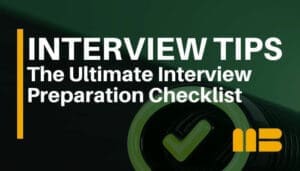Having an interview prep checklist is a good idea if you have an upcoming job interview and want to feel more confident and prepared. At MatchBuilt, we understand how overwhelming it can be to prepare for an interview, especially if you’re unsure what to expect. We’ve created a comprehensive interview prep checklist to help you succeed.
Our interview prep checklist covers all the essential topics you need to know before your big day. We’ll help you research the company and role, review the job requirements, and prepare for common interview questions. We’ll also provide tips on how to make a great first impression, such as maintaining eye contact and being a team player.
Additionally, we’ll guide you through the day of the interview and provide advice on the best way to approach the hiring manager and hiring team. We’ll also discuss the types of questions you may encounter and how to ask great questions at the end of the interview. At the end of the interview, it’s essential to have a clear idea of the next steps and how to follow up effectively. We’ll discuss this and how to ensure you get a good night’s sleep before the interview.
Our interview prep checklist is customizable to your specific needs and the job requirements you’re applying for. Whether you’re a recent graduate or a seasoned professional, our list will help you feel more confident and prepared for your next interview. We know the best candidate is qualified for the job and fits nicely into the company culture. That’s why we’ll advise you to research the company’s website and determine if the company suits you.
Having strong interviewing skills and bringing copies of your
The interview preparation checklist we’ve created is a comprehensive guide that covers essential topics to help you succeed in your upcoming interview, such as:
- Researching the company and role
- Reviewing your
resume and cover letter - Preparing for common interview questions
- Preparing your attire and materials
- Planning your route to the interview location
- Maximizing post-interview follow-up
We’ll detail these topics and provide actionable tips and advice to help you feel more confident and prepared for your next job interview. So if you’re ready to ace your next job interview, let’s dive into our comprehensive interview prep checklist together.
Research the Company for Critical Details
Before entering the interview room, you must do your homework to make an excellent first impression and be seen as a top candidate. The best way to do this is by exploring key research areas related to the company and the role. With the help of our job interview preparation checklist, we’ve compiled a list of critical research areas that will help you become a better candidate for the position.
The company’s mission statement, culture, and values are among the most critical research areas. By understanding what the company stands for and its culture, you can show that you’re a good fit and a team player. It would be best to familiarize yourself with the company’s products or services, competitors, recent news or press releases, and notable accomplishments or awards. These areas will help show that you’re invested and interested in the position.
In addition to the above, reviewing the position description carefully is crucial. Ensure you understand the requirements and qualifications for the role and prepare examples of how your skills and experience match those requirements. Additionally, be prepared for difficult questions, such as those related to technical interviews. You can also seek the help of an interview coach to help you prepare for these kinds of questions.
By taking the time to research these key areas on the following interview prep checklist, you’ll be better equipped to answer questions during the interview and demonstrate that you’re a good hire.
Company Research Interview Prep Checklist:
| Company Research Area | Details to Look For |
|---|---|
| Company Mission Statement | What is the company’s purpose or vision? |
| Culture | What are the company’s values and beliefs? How do employees describe the work environment? |
| Products/Services | What does the company sell or offer? What makes them unique in the market? |
| Competitors | Who are the company’s main competitors? How does the company differentiate itself? |
| Recent News/Press Releases | What is the company currently working on? Have they announced any recent milestones or accomplishments? |
| Notable Accomplishments/Awards | Has the company won any awards or been recognized for any achievements? |
Vet the Job Description to Ensure a Great Match
Preparing for your job interview starts with understanding the job description. Thoroughly reviewing the job description is a crucial step in your interview preparation process as it provides you with a clear understanding of the job requirements and responsibilities. By studying the job description, you can tailor your responses and showcase how your skills and experience align with the role.
Don’t just skim through the job description; take the time to read and analyze it carefully. Highlight the key phrases and requirements to help you prepare specific examples demonstrating your qualifications. This will show the interviewer that you are genuinely interested in the position and have put effort into researching it.
The job description serves as a roadmap to success during the interview process. It provides valuable insights into the company’s expectations and priorities, allowing you to understand better how you can contribute to its success. By studying the job description, you can prepare well-thought-out responses that showcase your experience, skills, and qualifications.
Remember, completing your job interview concerns more than meeting the job requirements. It’s about making a good impression, demonstrating you are a team player and showcasing why you are the best talent for the job. So, take the time to research the job description thoroughly, prepare a list of common interview questions, and focus on making a great impression during your interview.
Job Description Interview Prep Checklist
| Job Description Review Area | Details to Look For |
|---|---|
| Job Title and Responsibilities | Is the job title consistent with the role you’re applying for? Do you understand the key responsibilities and requirements of the job? |
| Required Skills and Qualifications | Do you have the required skills and qualifications listed in the job description? If not, can you describe the transferable skills or experiences that make you a strong candidate? |
| Company Culture and Values | Does the job description provide any insight into the company culture or values? Are these values aligned with your own? |
| Performance Expectations | Are there any specific performance expectations listed in the job description, such as sales targets or project deadlines? Can you speak to how you’ve met similar expectations in the past? |
| Reporting Structure | Do you understand the reporting structure of the position, including who you’ll be working with and who you’ll be reporting to? |
| Salary and Benefits | Are the salary range and benefits package listed in the job description? Does it align with your expectations and needs? |
Review Your Resume and Refine Your Pitch
When preparing for a job interview, it’s essential to review your
As you review your
Another important consideration when preparing for an interview is to be aware of the dress code and dress appropriately. This is an excellent practice to help you feel more confident and together.
Mock interviews and practice answering common questions can also help build your interview experience and ensure you’re presenting yourself in the best possible light. Finally, it’s important to be mindful of your social media presence and ensure your online profile is professional and appropriate.
Remember, the interview is your chance to show that you’re a top talent and qualified candidate for the position. By reviewing your
Resume Interview Prep Checklist
| Resume Review Area | Details to Look For |
|---|---|
| Formatting/Layout | Is the formatting consistent throughout the document? Is the font size and style easy to read? |
| Spelling/Grammar | Are there any spelling or grammar errors? Have you used proper punctuation and capitalization? |
| Relevance to Job Requirements | Do your skills and experiences match the job requirements listed in the job posting? Have you highlighted relevant accomplishments? |
| Accomplishments | Have you included any notable accomplishments or achievements? Have you quantified results when possible? |
| Keywords | Have you used industry-specific keywords or phrases? Does your |
| Contact Information | Is your contact information up-to-date and easy to find? Have you included links to your professional social media profiles or website, if relevant? |
Sharpen Your Interview Skills by Practicing
Practicing your responses to common interview questions is essential to ensure you are fully prepared for the big day. After all, most interviewers are armed with a strategic list of questions they’ll ask you. While it can be challenging to predict exactly what an interviewer will ask, there are some common questions that you can prepare for in advance.
Prepare for These Common Interview Questions
By practicing your answers to common interview questions, you’ll be able to articulate your experience and skills more effectively and demonstrate your fit for the job. It also helps reduce anxiety and nervousness during the interview, allowing you to present yourself more confidently and professionally.
| Common Interview Question | Tips on How to Answer |
|---|---|
| Tell me about yourself. | Provide a brief overview of your professional background and experience, focusing on how it aligns with the job you’re applying for. Emphasize your skills and achievements, highlighting what makes you stand out as a candidate. |
| Why do you want to work here? | Demonstrate your knowledge of the company and its values, and explain how they align with your own career goals. Highlight specific aspects of the job or company that appeal to you, such as opportunities for growth or positive company culture. |
| What are your strengths and weaknesses? | Focus on strengths that are relevant to the job, such as your communication skills or ability to work well in a team. When discussing weaknesses, be honest but also provide examples of how you’re working to improve in those areas. |
| Can you tell me about a time when you overcame a challenge? | Use the STAR method to provide a detailed and structured response. Start by describing the situation or challenge, then explain the task you had to complete, your actions, and the results you achieved. |
| What motivates you in your work? | Discuss what drives you to succeed in your career, whether it’s a desire to make a positive impact, a passion for the industry, or a personal goal you’re working towards. Emphasize how this motivation aligns with the company’s goals and values. |
| How do you handle stress or pressure? | Provide specific examples of how you’ve handled high-pressure situations in the past, such as meeting a tight deadline or resolving a difficult issue. Explain your strategies to manage stress, such as time management or communication skills. |
| What are your salary expectations? | Research industry standards and provide a range that aligns with your experience and the job requirements. Avoid giving a specific number if possible, and instead, provide a range that is flexible. |
| Can you tell me about a time when you had to work with a difficult colleague? | Use the STAR method to provide a specific and detailed response. Describe the situation, your task, your actions to resolve the issue, and the results you achieved. Emphasize how you maintained professionalism and effective communication throughout the process. |
| What do you know about our company? | Research the company’s history, values, and products or services. Highlight any recent news or achievements, and explain how your skills and experience align with the company’s goals. |
| What questions do you have for me? | Prepare several thoughtful questions in advance, such as asking about company culture or opportunities for growth. Avoid asking about salary or benefits unless it has already been discussed. |
Prepare for These Behavioral Interview Questions
It’s important to note that many employers now use behavioral interview questions, which require you to provide specific examples of your skills and experience. The STAR method effectively answers these types of questions: Situation, Task, Action, and Result.
- Situation: Describe the context and background of the scenario you’re discussing.
- Task: Explain the specific task or goal you were responsible for in the situation.
- Action: Describe the actions you took to address the task or achieve the goal.
- Result: Share the outcome of your actions and their impact on the situation or task.
Using this method, you can provide a structured, detailed response highlighting your abilities and accomplishments.
Overall, practicing your responses to common interview questions and using the STAR method for behavioral questions will help you to stand out as a qualified candidate and increase your chances of landing the job.
| Behavioral Interview Question | Tips on How to Answer |
|---|---|
| Tell me about a time when you had to solve a difficult problem. | Structure your answer using the STAR method (Situation, Task, Action, Result). Provide a clear example of a difficult problem you faced, the steps you took to solve it, and the outcome. Highlight your problem-solving skills and ability to handle challenges. |
| Describe a time when you had to work under pressure. | Again, use the STAR method to structure your answer. Explain the situation that caused the pressure, the specific tasks you were working on, the actions you took to complete the tasks, and the results of your efforts. Remember to emphasize your ability to stay calm and focused in stressful situations. |
| Can you give an example of a time when you had to collaborate with a difficult colleague? | Use the STAR method to structure your answer. Describe the situation, the specific tasks you were working on, the actions you took to collaborate with the difficult colleague, and the outcome. Highlight your communication and problem-solving skills and your ability to work with various personalities. |
| Tell me about a time when you had to adapt to a new situation. | Use the STAR method to structure your answer. Explain the situation that required adaptation, the specific tasks you were working on, the actions you took to adapt, and the results of your efforts. Be sure to emphasize your flexibility and ability to learn quickly. |
| Describe a time when you had to take initiative on a project. | Use the STAR method to structure your answer. Provide a specific example of a project you took initiative on, the actions you took to make it happen, and the results of your efforts. Highlight your leadership and problem-solving skills. |
| Can you give an example of a time when you had to deal with a difficult customer? | Use the STAR method to structure your answer. Describe the situation, the specific tasks you were working on, the actions you took to deal with the difficult customer, and the outcome. Highlight your customer service and communication skills. |
| Tell me about a time when you had to persuade someone to see your point of view. | Use the STAR method to structure your answer. Provide a specific example of a situation where you had to persuade someone to see things from your perspective, the actions you took to persuade them, and the results of your efforts. Emphasize your communication and negotiation skills. |
| Describe a time when you had to make a difficult decision. | Use the STAR method to structure your answer. Explain the situation that required a difficult decision, the specific tasks you were working on, the actions you took to make the decision, and the results of your efforts. Highlight your problem-solving and decision-making skills. |
| Can you give an example of a time when you had to learn a new skill quickly? | Use the STAR method to structure your answer. Describe the situation that required the new skill, the specific tasks you were working on, the actions you took to learn the skill quickly, and the results of your efforts. Highlight your ability to adapt and learn quickly. |
| Tell me about a time when you had to lead a team to achieve a goal. | Use the STAR method to structure your answer. Provide a specific example of a situation where you had to lead a team, the actions you took to motivate and guide the team, and the results of your efforts. Emphasize your leadership and communication skills. |
Prepare Thoughtful Questions To Show Your Passion and Preparation
Having questions prepared to ask the recruiter or hiring manager is essential to any job interview. It not only shows your interest in the position, but it also provides you with valuable information about the company and the role you’re applying for.
One of the easiest ways to create questions is to start by considering what you’d like to know about the company or position. For example, you might want to learn more about the company culture, the team you’ll work with, or the job’s specific challenges.
Once you have a list of potential questions, prioritize them based on their importance. Consider which questions are essential for you to have answered to make an informed decision about whether the job is a good fit for you.
It’s also a good idea to research beforehand to see if your questions have already been answered on the company’s website or other online resources. This way, you can avoid asking questions that might make you seem unprepared or uninformed.
During the interview, don’t be afraid to ask your questions. Remember, the interview is a two-way conversation, and the hiring manager expects you to have questions. Be attentive, listen carefully to the hiring manager’s answers, and take necessary notes.
In summary, having well-prepared questions for the hiring manager is critical to making a good impression and learning more about the company and position. By researching and prioritizing your questions, you’ll be better equipped to have a successful job interview and make an informed decision about your future career.
Effective Questions to Ask in Any Interview
| Question | Why it works |
|---|---|
| Can you tell me more about the company culture and work environment? | This shows that the candidate is interested in more than just the job itself and values the overall workplace atmosphere. |
| What are some of the biggest challenges the company is facing right now? | This question shows that the candidate is interested in the bigger picture and wants to understand the company’s current position in the industry. |
| How does the company measure success, and what are the key performance indicators (KPIs)? | This demonstrates that the candidate is results-oriented and wants to understand how their work will contribute to the company’s success. |
| How would you describe the team I’ll be working with? | This indicates that the candidate values teamwork and wants to understand how they will fit in with their colleagues. |
| Can you walk me through a typical day in this position? | This helps the candidate visualize themselves in the role and get a better sense of what the day-to-day responsibilities will be. |
| How does the company invest in employee development and growth? | This shows that the candidate is interested in long-term career growth and wants to understand the opportunities available at the company. |
| Can you provide more information on the company’s mission and values? | This shows that the candidate is interested in aligning with the company’s values and wants to understand how they fit into its larger mission. |
| How does the company approach innovation and staying ahead in the industry? | This demonstrates that the candidate is interested in the company’s future and wants to understand how they can contribute to innovation and growth. |
| Can you tell me about a recent project or initiative the team has worked on? | This shows that the candidate is interested in the team’s work and wants to understand their role in ongoing projects. |
| What are the next steps in the interview process? | This demonstrates that the candidate is eager to move forward in the process and values communication and transparency. |
Nail Your Interview Attire for a Great First Impression
When it comes to nailing your interview attire, it’s essential to consider the company culture and dress code. You want to ensure that you’re dressing appropriately for the role you’re interviewing for while still showcasing your personal style.
One rule of thumb is always to dress one level up from the company’s dress code. For example, if the company’s dress code is business casual, dress in business professional attire. This shows that you take the interview seriously and that you’re willing to put in the effort to make a great first impression.
It’s also a good idea to research the company culture beforehand. If the company has a more relaxed culture, you may be able to get away with dressing in business casual attire. However, if the company has a more traditional culture, you’ll want to dress in professional business attire.
When in doubt, it’s always better to be overdressed than underdressed. A well-tailored suit or dress can go a long way in making a positive first impression.
Remember, it’s not just about what you wear – it’s also about how you present yourself. Make sure that your clothing is clean and pressed and that you’re well-groomed. This shows that you pay attention to the details and are committed to presenting yourself in the best possible light.
In summary, nailing your interview attire requires balancing dressing appropriately for the role and showcasing your personal style. By researching the company culture and dressing one level up from the dress code, you can maximize your first impression and increase your chances of landing the job.
Here’s a checklist of necessary items to bring with you to your interview:
Attire and Materials Interview Prep Checklist
| Attire Tips |
|---|
| Dress appropriately for the role and company culture |
| Dress one level up from the company’s dress code |
| Choose a well-tailored suit or dress |
| Make sure clothing is clean and pressed |
| Be well-groomed |
| Items to Bring |
|---|
| Copies of your |
| References list |
| Portfolio or work samples |
| Pen and notepad |
| Any requested documents or forms |
Plan Your Route to Avoid Heavy Traffic or Closures
Planning your route to the interview is crucial in ensuring that you arrive on time and make an excellent first impression. Arriving late to an interview can send the message that you’re unreliable and unprofessional, significantly impacting your chances of getting the job.
It’s important to plan your route in advance and allow extra time for unexpected delays such as traffic or construction. Use tools like Google Maps or Waze to estimate travel time and plan your route accordingly. If possible, consider doing a trial run before the interview to familiarize yourself with the route and avoid surprises.
It’s also important to consider the mode of transportation you’ll be using. If you’re driving, ensure you have enough gas in your car and that it’s in good working condition. If you’re taking public transportation, check schedules and be aware of any delays or route changes.
Arriving too early can also be problematic. While arriving on time is essential, arriving early can inconvenience the interviewer and disrupt their schedule. Aim to arrive no more than 10-15 minutes early to avoid awkward waiting times.
Failing to plan your route ahead of time can lead to various pitfalls. You may arrive late and miss your opportunity, or you may arrive flustered and stressed, which can negatively impact your performance during the interview. By planning your route in advance, you’ll set yourself up for success and be one step closer to landing your dream job.
The following interview prep checklist provides essential items to consider when planning your journey:
Route Planning Interview Prep Checklist
| Checklist for Planning Your Journey to the Interview Location: |
|---|
| Research the route to the interview location beforehand and ensure you know how to get there. Use GPS or online maps to find the most direct and efficient route. |
| If you’re driving, ensure you know where to park and allow extra time in case of traffic or other delays. |
| If you’re using public transportation, check the schedule and plan your journey accordingly. Consider alternative routes in case of service disruptions or delays. |
| Estimate your travel time and plan to arrive at least 10-15 minutes early. This will give you time to compose yourself and mentally prepare for the interview. |
Master the Post-Interview Follow-Up
Following up after an interview can be critical in landing your desired job. It shows your enthusiasm and interest in the position and allows you to reiterate your qualifications and leave a lasting impression.
It’s essential to be empathetic when following up, as the hiring process can be stressful for both the candidate and the employer. Remember that they may be juggling multiple candidates or dealing with unexpected delays, so be patient and courteous in your interactions.
One effective way to follow up is to send a thank-you email within 24 hours of the interview. Your email should express your gratitude for the opportunity to interview and reiterate your interest in the position. It’s also a chance to highlight any points you may have missed during the interview or clarify any questions that may have come up.
When sending a follow-up email, personalize it and reference specific details from your conversation with the interviewer. This shows that you were attentive and engaged during the interview and helps you stand out from other candidates.
If you don’t hear back after your initial follow-up email, it’s appropriate to follow up again after a week or two. However, it’s important not to be too pushy or persistent, as this can come across as desperate or unprofessional.
In addition to email, you can also consider making a phone call to follow up. However, be mindful of the company’s preferred communication methods and follow the interviewer’s instructions.
In summary, following up after an interview can be an effective way to stay top-of-mind with the employer and demonstrate your interest in the position. A thank-you email is a great place to start, but be sure to personalize it and avoid being too pushy or persistent in your follow-up efforts. With a little effort and persistence, you can increase your chances of landing the desired job.
Post-Interview Follow-Up Checklist
| Action | Why it’s important |
|---|---|
| Send a thank-you email | Shows gratitude and reiterates interest in the position |
| Reflect on the interview | Helps to identify strengths and areas for improvement |
| Review notes and follow-up items | Ensures that any promises made during the interview are fulfilled |
| Connect with the interviewer on LinkedIn | Helps to build a professional network |
| Check-in with any references | Keeps them in the loop and ensures they are prepared to speak about your qualifications |
| Continue your job search | Even if the interview went well, it’s important to keep your options open |
| Research the company further | Provides more information for future interactions and potential job offers |
| Follow the company on social media | Helps to stay updated on company news and developments |
| Reach out to any contacts at the company | Can provide additional insights or connections |
| Prepare for a potential second interview | Shows dedication and readiness for the next step in the hiring process |
Your Interview Preparation FAQs, Answered
The 7 preparations for interviews are to research the company and position, prepare answers to common interview questions, practice your responses, dress appropriately for the role and company culture, prepare any necessary documents or materials, plan your route to the interview location, and follow up after the interview.
The 4 P's in preparing for an interview are: Prepare by researching the company and the role, Practice answering common interview questions, Present yourself professionally during the interview, and Participate actively by asking questions and engaging with the interviewer.
The STAR method is a technique used in job interviews to help candidates provide structured and detailed responses by describing a specific situation, task, action, and result related to a previous work experience.
You should research the company, the role you're applying for, and the interviewer.
You should dress professionally and appropriately for the job you're applying for.
You should aim to arrive 10-15 minutes early, but not too early, that you're waiting around for a long time.
If requested, you should bring a few copies of your resume, a pen and paper to take notes, and any relevant documents or materials.
You should expect a mix of behavioral, situational, and technical questions related to the job you're applying for.
You should answer difficult questions honestly and succinctly, using the STAR method to structure your responses.
Yes, you should send a thank-you email or note after the interview to show your appreciation and keep yourself top of mind.
You can practice your interview responses, do some deep breathing exercises, and remind yourself of your strengths and qualifications.
Don’t Miss a Beat: Be Interview Ready with Our Complete Interview Prep Checklist
Preparing for an interview can be daunting, but following the steps of each interview prep checklist outlined in this post can make you feel confident and well-prepared. By researching the company and role, reviewing your
At MatchBuilt, we are dedicated to helping job seekers succeed in their job search. Our website is filled with valuable resources, including tips on job searching, interviewing,






